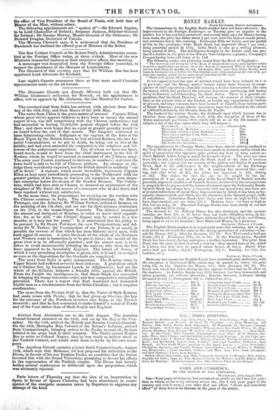The news from China is the great matter of interest.
Captain Elliot, whose great object appears hitherto to have been to secure the annual export of tea, was still temporizing with the Chinese authorities ; and had succeeded in having 11,000,000 pounds shipped before the 18th May ; and there were hopes that an equal or greater quantity would be on board before the end of that month. The Emperor continued to issue fulminating edicts. Indignant at the capture of the forts of the Boma Tigris by the British forces, he had ordered Keshen, the late Im- perial Commissioner, to be put to death, by being cut in two at the middle, and had even extended his vengeance to the relatives and fol- lowers of the unfortunate negotiator. Lin, of whom we have not lately heard much, is said to have been the chief instrument in the fall of Keshen, whom he hoped to succeed in command of the :Chinese army. The army near Canton continued to increase in numbers ; and even the town itself is said to be full of Chinese soldiers. An attempt to dis- lodge them was shortly expected, lest the British should be suddenly " cut off in detail." A rumour, which seems incredible, represents Captain Elliot as bent upon immediately proceeding to the Northward with the greater portion of his forces, to retrieve his reputation by some despe- rate enterprise before the rteurn of Sir Gordon Bremer. The Colum- bine, which had been sent to Chusan to demand an explanation of the slaughter of Mr. Stead, the master of a transport who lauded there, had been repulsed without any satisfaction. In the mean time, the preparations for carrying on the warfare with the Chinese continue in India. The new Plenipotentiary, Sir Henry Pottinger, and the Admiral, Sir William Parker, arrived at Bombay on the morning of the 7th July, and set out for their ultimate destination on the 17th, in the steam-frigate Sesostris. The Admiral examined the arsenal and dockyard of Bombay, in order to know their capabili- ties ; for, as he said, " the Chinese dispute may be settled in a few months, or it may last for years." It is understood that the policy to be pursued by Sir Henry Pottinger, the new Plenipotentiary, and Ad- miral Sir W. Parker, the Commandant of the Forces, is as nearly as possible the reverse of that which has been hitherto acted upon, with such signal ill success. A strict blockade of the whole of the Southern and Western coast is immediately to be put in force; the mouth of the great river is to be effectually guarded ; and the utmost care is to be taken to avoid unnecessarily irritating the natives, who from the first have appeared to be favourably disposed. The island of Amoy, of which a very promising description is given, will, it is said, be occupied as soon as the dispositions for the blockade are completed. The news from India is quite unimportant. The Bombay army in Upper Scinde had suffered severely from sickness. A gratuitous attack on a Ghilzee fort, by Lieutenant Lynch, in Affghanistan, had set the whole of the Ghilzies, hitherto a friendly tribe, against the British. From the Punjab the intelligence is, that Shere Singh has succeeded in bringing his troops into some order, and that comparative tranquillity prevailed. There was a report that Earl Auckland had demanded 10,000 men as a reinforcement from the Siekh Chieftain ; but it requires confirmation.
The news from the Persian Gulf is, that the Vizier of Shah Kamran had made terms with Persia ; that he had given up Ghorian, the key for the entrance of the Northern invaders into India, to the Persian monarch ; and that he had consented to make himself a vassal of Persia and of the Czar rather than of Shah Soojah and England.


























 Previous page
Previous page